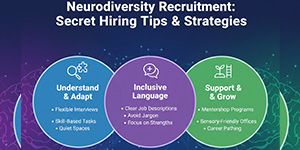Enhancing Teamwork in the Workplace: Strategies for Success
Every modern company is built on teamwork. It inspires creativity, builds confidence, and helps groups of people to reach common objectives. Enhancing teamwork in the workplace requires a mix of talents, communication, and leadership that produces a flawless flow of cooperation rather than only about working together. The article explores practical techniques to improve teamwork skills in the workplace and produce significant outcomes.
 |
Understanding Teamwork Skills in the WorkplaceTeamwork skills are vital for collaboration, fostering trust, and achieving shared workplace goals: • Define the essence of teamwork skills in the workplace and their importance.
|
• Explore key components such as communication, trust, and accountability.
• Highlight examples of successful teamwork skills in the workplace in various industries.
Skills in teamwork are those interpersonal and cooperative ones that enable people to cooperate peacefully toward shared objectives. All of these—active listening, flexibility, and responsibility—help to foster a good workplace.
The Role of Effective Communication for Teams
Effective communication is key to fostering collaboration, clarity, and alignment within teams. Here are guide:
• Define effective communication for teams and its impact on collaboration.
• Discuss verbal and non-verbal communication techniques.
• Explain how feedback fosters clarity and understanding.
Without clear communication, even the best teams can falter. Open dialogue, concise messaging, and a willingness to listen ensure that all team members remain aligned.
Building Trust in Teams: The Foundation of Collaboration
Trust is the foundation of strong teamwork, enabling collaboration, accountability, and mutual respect:
• Explain the importance of building trust in teams.
• Discuss transparency, respect, and honesty as trust-building tools.
• Provide strategies to nurture trust in diverse teams.
Trust is the glue that binds a team together. When trust exists, team members feel secure enough to share ideas and take constructive risks.
Collaboration and Teamwork: Why It Matters
Collaboration and teamwork drive innovation, shared responsibility, and success in achieving common goals:
• Define collaboration and teamwork as complementary forces.
• Share benefits such as increased creativity and shared workload.
• Highlight examples of organizations excelling through collaboration.
Collaboration leverages diverse perspectives, ensuring innovative solutions and an equitable distribution of tasks.
Leadership in Teamwork: Guiding Success
Effective leadership drives teamwork, fostering collaboration and achieving shared success, Here is the guide:
• Discuss the role of leadership in teamwork in fostering productivity.
• Highlight leadership styles that enhance collaboration.
• Provide actionable steps for managers to empower their teams.
Great leaders set the tone for teamwork skills in the workplace by encouraging inclusion, motivating team members, and setting clear goals.
Problem-Solving in Teams: Turning Challenges into Opportunities
• Define problem-solving in teams and its role in overcoming obstacles.
• Outline systematic approaches like brainstorming and consensus-building.
• Share real-world scenarios of effective problem resolution.
Effective teamwork hinges on the ability to tackle challenges head-on. Problem-solving ensures smoother workflows and more resilient teams.
Team Goal Setting for Success
• Explain the significance of team goal setting in achieving shared objectives.
• Explore SMART goals and their application in the workplace.
• Provide tips for aligning individual and team goals.
Team goals ensure focus and clarity. By aligning them with organizational objectives, teams can drive consistent and measurable success.
Adaptability in Teamwork: Staying Agile
• Define adaptability in teamwork and its role in dynamic work environments.
• Discuss the value of flexibility in managing changes.
• Provide examples of adaptable teams thriving under pressure.
Adaptability empowers teams to pivot during unexpected challenges, ensuring consistent performance and innovation.
Accountability in Teams: Owning Responsibilities
• Emphasize the importance of accountability in teams for a healthy work dynamic.
• Discuss tools and methods for tracking progress.
• Highlight the impact of accountability on team morale and outcomes.
Accountability fosters a culture of ownership and trust, ensuring that all members contribute meaningfully to team goals.
The Team Decision-Making Process
• Explain the essence of team decision-making processes and their benefits.
• Discuss consensus-building and conflict resolution techniques.
• Share tools to facilitate collaborative decision-making.
Effective decisions stem from balanced discussions where every team member has a voice. Structured decision-making ensures better alignment and results.
Flexibility in Work Environments and Teamwork
Here are some points of this Flexibility in Work Environments and Teamwork:
• Highlight the connection between flexibility in work environments and team collaboration.
• Explore benefits such as reduced stress and improved productivity.
• Provide actionable tips for creating flexible workplaces.
Flexibility fosters inclusivity and innovation, enabling teams to adapt to changing work demands without compromising quality.
Enhancing Teamwork in the Workplace with Tools and Technology
Using contemporary tools and technology helps one to progressively improve teamwork skills in the workplace. Using project management tools like Trello or Asana guarantees teams remain in line and effective by streamlining work delegation, progress monitoring, and collaboration. Telegram or Microsoft Teams help to create smooth interactions, therefore removing obstacles to quick and efficient communication. Furthermore, technology is essential in bridging distances in remote teamwork, allowing virtual meetings, file sharing, and real-time updates. These developments show how much enhancing teamwork in the workplace and cooperation in the contemporary company might be enhanced by using the appropriate technologies.
Measuring Team Performance
People may wonder what is measuring team performance, Here is the guide:
• Explain the metrics for assessing teamwork effectiveness.
• Explore tools like peer reviews and performance tracking software.
• Share examples of successful team evaluations.
Regular performance assessments highlight strengths and identify areas for improvement, driving continuous teamwork enhancements.
Strategies for Sustaining Long-Term Teamwork Skills
Maintaining a good company culture and consistent achievement depend on employees keeping their ability to be cooperative. Frequent team training and development conferences enable staff members to improve their capacity for cooperation and change with the times. Promoting honest communication, mutual respect, and shared responsibility helps to create a cooperative culture in which teamwork is flourishing. Furthermore, ensuring that teamwork abilities in the workplace remain a fundamental strength is the application of best practices, which include clearly defined goals, appreciation of team achievements, and constructive resolution of problems. Organizations that give these methods top priority will be able to create and maintain a cohesive and competent staff.
Common Challenges in Enhancing Teamwork in the workplace and Solutions
Here are points of common Challenges in Enhancing Teamwork in the workplace and Solutions:
• Highlight typical hurdles teams face, such as communication gaps or cultural differences.
• Provide actionable strategies for overcoming these barriers.
• Share insights into maintaining harmony in diverse teams.
Proactively addressing challenges ensures that teams remain cohesive and focused on their goals.
Read More: 5 Effective Ways to Improve Your Teamwork Skills
Conclusion
Enhancing teamwork in the workplace is a multifarious task including good leadership, clear communication, and trust building. Organizations may build outstanding teams by emphasizing flexibility, responsibility, and teamwork that will help them to produce results. Maintaining these efforts in a fast-changing workplace depends on ongoing education and acceptance of diversity.
Read More: What is the Importance of Communication Skill at Workplace
Frequently Asked Questions
1. What are the key teamwork skills in the workplace?
Teamwork skills in the workplace include communication, problem-solving, adaptability, and accountability.
2. How can I enhance collaboration in the workplace?
Use effective communication strategies, foster trust, and align team goals for better collaboration.
3. What are some tools to enhance teamwork in the workplace?
Project management tools like Trello, Asana, and communication platforms like Slack can improve teamwork.
4. How can we measure team performance effectively?
Use metrics like goal achievement rates, peer reviews, and individual contributions to assess team performance.
5. What challenges do teams face in workplaces?
Common challenges include miscommunication, cultural differences, and unclear goals, which can be mitigated through training and clear processes.
Read More: How to Resolve Workplace Conflict - An Important Guide





